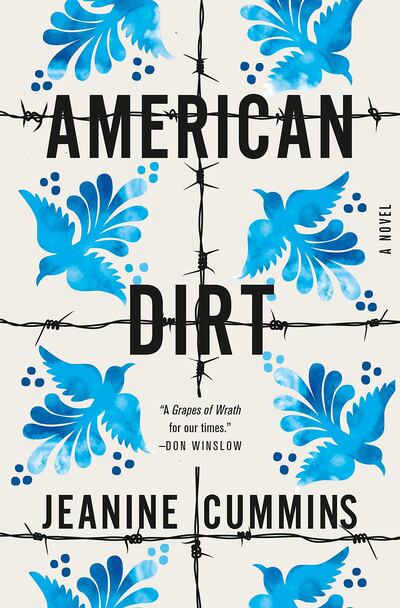One Saturday in April, a birthday party at a home in Acapulco, Mexico is interrupted by the arrival of trigger-happy gunmen. Lydia and her 8-year-old son, Luca, manage to hide in the shower. When they emerge, they discover they are the sole survivors of a massacre. Among the 16 fatalities is Lydia's husband, Sebastian. Attached to the "warm wreckage" of his body is a sign: "My whole family is dead because of me." Fleeing the carnage with Luca, Lydia finds a note tucked behind the windscreen wiper of their car, on which is written one stark word: "Boo!"
Lydia knows only too well who has authorised the bloodbath. Some time ago she befriended Javier, one of the customers at her bookshop. He proved to be charming and well-read; he wrote poems, came with gifts and even declared his love for her. But when Sebastian, an investigative journalist, wrote an exposé about a brutal narcotic cartel headed by a new kingpin nicknamed The Owl, Lydia quickly realised Javier and the drug lord were one and the same. Now, with her family killed and Javier's murderous henchmen scouring the city for the two that got away, Lydia is left with no choice but to find sanctuary for herself and her son.
Javier's malign influence stretches far and wide, so Lydia makes plans to start afresh in Denver, where some of her relatives have made a new life for themselves. She empties her bank account, packs clothes, supplies and a small machete, and sets off with Luca on the arduous and perilous journey towards el norte. So begins American Dirt, Jeanine Cummins's compelling tale about a mother and her son, and their desperate struggle to stay alive.

It is a marked departure for Cummins, whose first two novels were set in Ireland. This, her third, highlights the hardships and atrocities faced by Hispanic migrants in search of a better life.
However, this new subject matter has not come without its criticism. Cummins has come under fire for appropriating immigrant's stories and culture, and questions have been raised over whether she should be the one to tell this story.
This week, American Dirt publisher Flatiron Books cancelled Cummins' book tour due to safety concerns.
But the novel has regardless found favour with many authors, and with Oprah Winfrey, with the media mogul naming it as her book club pick of the week.
With supreme dexterity, Cummins delivers a book that works magnificently on two levels: it is an exhilarating white-knuckle ride packed with tension and thrills, and also a powerful drama with the capacity to overhaul stereotypes and alter mindsets. Battling trauma and grief, hunger and fatigue, Lydia and Luca keep moving. In Mexico City, Lydia considers disguising themselves as migrants. Then it dawns on her that no disguise is necessary for they are already migrants, those people who leave their homes and risk their lives "for the chance to get to the dream of some faraway country that doesn't even want them".
They join forces with a pair of Honduran sisters who are also in need of a safe haven, and together they make a series of hazardous trips on top of the freight train La Bestia. When they think the worst of their ordeals is at last behind them, they reach the border, pay an exorbitant fee to a coyote and follow him on a gruelling, make-or-break trek through unforgiving desert.
This is a novel that grips us from the first page and propels us forward. Like the beleaguered father and son of Cormac McCarthy's The Road, we root for Cummins's mother and son every step of the way, all the time painfully aware that the odds are firmly stacked against them. At a migrant shelter, a priest makes this clear in a sobering speech filled with harsh facts. "Only one out of three will make it to your destination alive," he says. "Some of you will fall from the trains. Many will be maimed or injured. Many will die. Many, many of you will be kidnapped, tortured, trafficked or ransomed."
Lydia and Luca experience or witness horrors at every turn. Other migrants share their stories of anguish. There are unsparing accounts of the violence – "the gang pageant of blood and grisly one-upmanship" – that comprises the cartels' warped moral code. Cummins deserves praise for telling it as it is, without diluting cruelty or whitewashing crimes. The grim truth that the novel imparts is that Mexican narcos operate with impunity and migrants suffer considerably before reaching their promised land.
And yet American Dirt is not entirely bleak. Sporadic beams of light temper the gloom. Humanity shines through. Some friends turn out to be foes, but, for the most part, Lydia and Luca benefit from the kindness of strangers. At one point Lydia believes she and her son have become worthless nonentities: "We have already disappeared, she thinks. We already do not exist." But Cummins ensures her two protagonists always loom large on the page as sympathetic flesh-and-blood creations. As she explains in her author's note at the end: "The people coming to our southern border are not one faceless brown mass but singular individuals."
Latin American critics have deemed it “racist”, but this is still a gut-wrenching, heart-rending tale. It makes for a transformative reading experience.







